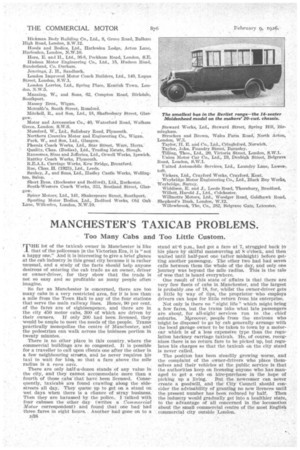MANCHESTER'S TAXICAB PROBLEMS.
Page 22

If you've noticed an error in this article please click here to report it so we can fix it.
Too Many Cabs and Too Little Custom.
rpHEE lot of the taxicab owner in Manchester is like J. that of the policeman An the Victorian Era, it is "not a happy one." And it is interesting to give a brief glance at the cab industry in this great city because it is rather unusual, and a study of the facts should' help anyone desirous of entering the cab trade as an owner, driver or owner-driver, for they show that the trade is not so easy anti so profitable as many people often imagine.
• So far as Manchester is concerned, there are too many cabs in a very restricted area, for it is less than a mile from the Town Hall to any of the four stations that serve the main railway lines. Hence, 90 per cent. of the fares are of eighteenpence, and there are in the city 450 motor cabs, 300 of which are driven by their owners. If only 200 had been licensed, they would be ample to meet the needs of the people. Trams practically monopolize the centre Of Manchester, and the pedestrian can walk across the business portion in twenty minutes.
There is no other place in this country, where the commercial buildings are do congested. It is possible for a traveller to call upon clients one after the other in a few neighbouring streets, and he never requires his taxi to wait for him, so that a fare ,above the mile radius is a rara, amis.
There are only half-a-dozen stands of any value in the city, and they cannot accommodate more than a fourth of those cabs that have been licensed. Consequently, taxicabs are found crawling along the sidestreets all day. They queue up to get on a stand on Wet days when there is a chance of stray business. Then they are harassed by the police. I talked with four cabmen the other day (writes a Commercial Motor correspondent) and found that . one had had thren fares in eight hours. Another had gone on to a D38 stand at'ai p.m., had got a fare at 7, struggled back to his place by skilful manceuvring at 8 o'clock, and then waited until half-past one (after midnight) before getting another passenger. The other two had had seven calls between them the whole of the day, and only one journey was beyond the mile radius. This is the tale of woe that is heard everywhere.
One result of this state of affairs is that there are very few fleets of cabs in Manchester, and the largest is probably one of 18, for, whilst the owner-driver gets a little by way of tips, the proprietor who employs drivers can hope for little return from his enterprise.
Not only, is there no "night life" which might bring a few fares, but the trams take what late passengers are about, for all-night services run to the chief suburbs. Moreover, people from the environs who Might be disposed to go by cab generally arrange with the local garage owner, to be taken to town by a motorcar which is of a less expensive type than the regulation hackney carriage taxicab. Be, of course, recognizes there is no return fare to be picked up, but regulates his charges so that the taxicab on the city stand is never called.
The position has been steadily growing worse, and the complaint of the owner-drivers who place themselves and their vehicles at the public service is that the authorities keep on licensing anyone who has managed to get a cab on hire-purchase in the hope of plcking up a living. But the newcomer can never create a goodwill, and the' City Council should consider the advisability of granting no new licences until the present number has been reduced by half. Then the industry would gradually get into a healthier state,: to the advantage of all concerned in the locomotion about the small commercial centre of the most English commercial city outside London.


























































